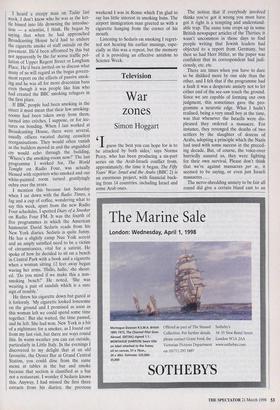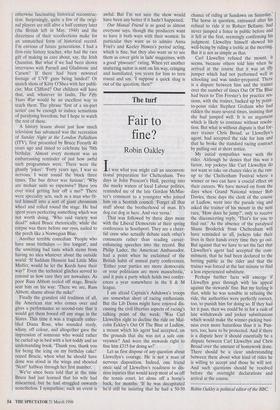Television
War zones
Simon Hoggart
Iguess the best you can hope for is to be attacked by both sides,' says Norma Percy, who has been producing a six-part series on the Arab-Israeli conflict from, approximately, the time it began. The Fifty Years' War: Israel and the Arabs (BBC 2) is an enormous project, with financial back- ing from 14 countries, including Israel and some Arab ones. The notion that if everybody involved thinks you've got it wrong you must have got it right is a tempting and understand- able trap. The same tone crops up in some British newspaper articles of the Thirties; it wasn't uncommon in those days to find people writing that Jewish leaders had objected to a report from Germany, but then so had Herr Hitler, so the paper was confident that its correspondent had judi- ciously, etc. etc.
There are times when you have to dare to be disliked more by one side than the other, and I felt that if the programme had a fault it was a desperate anxiety not to let either end of the see-saw touch the ground. Since we are capable of forming our own judgment, this sometimes gave the pro- gramme a neurotic edge. What I hadn't realised, being a very small boy at the time, was that whenever the Israelis were dis- pleased they ordered a massacre. For instance, they revenged the deaths of two settlers by the slaughter of dozens of Arabs, adopting a principle which the Nazis had used with some success in the preced- ing decade. But, of course, the voice-over hurriedly assured us, they were fighting for their own survival. Please don't think that we're against massacres per se, it seemed to be saying, or even just Israeli massacres ...
The nerve-shredding anxiety to be fair all round did give a certain bland cast to an otherwise fascinating historical reconstruc- tion. Surprisingly, quite a few of the origi- nal players are still alive a half century later (the British left in May, 1948) and the directness of their recollections make for an unmatched form of historical record. I'm envious of future generations. I had a first-rate history teacher, who had the rare gift of making us care about, say, the Irish Question. But what if we had been shown interviews with Parnell and Gladstone and Carson? If there had been newsreel footage of UVF guns being landed? Or snatch shots of Kitty O'Shea with her publi- cist, Max Clifford? Our children will have that, and, whatever its faults, The Fifty Years War would be an excellent way to teach them. The phrase 'first of a six-part series' can be enough to induce sensations of paralysing boredom, but I hope to watch the rest of these.
A history lesson about just how much television has advanced was the recreation of Sunday Night at the London Palladium (ITV), first presented by Bruce Forsyth 40 years ago and timed to celebrate his 70th birthday. Almost every moment was an embarrassing reminder of just how awful such programmes were. There were the ghastly 'jokes': 'Forty years ago, I was so nervous, I went round the block three times. The bus driver was furious'; 'Why are mohair suits so expensive? Have you ever tried getting hair off a mo?' There were speciality acts, such as a man who fit- ted himself into a sort of giant chromium wheel and rolled round the stage. He had spent years perfecting something which was not worth doing. 'Who said variety was dead?' asked Bruce rhetorically, while the corpse was there before our eyes, nailed to the perch like a Norwegian Blue.
Another terrible comedian: 'People who have most birthdays — live longest', and the unwitting bad taste which stems from having no idea whatever about the outside world: 'If Saddam Hussein had Little Miss Muffet, would he let the Kurds have their way?' Even the technical glitches served to remind us how rare they are nowadays. As poor Russ Abbott reeled off stage, Brucie sent him on his way: 'There we are, Russ Abbott, shame about the mike!'
Finally the grandest old tradition of all, the American star who comes over and gives a performance so second-rate that it would get them booed off any stage in the States. This time it was a tragically enfee- bled Diana Ross, who sounded reedy, whiny, off colour, and altogether gave the impression of someone who would rather be curled up in bed with a hot toddy and an undemanding book. 'Thank you, thank you for being the icing on my birthday cake!' oozed Bruck, when what he should have done was stood in the wings and shouted `Next!' halfway through her first number.
We've since been told that at the time Bruce had just learned that his wife had miscarried, but he had struggled onwards nonetheless. I sympathise; such an event is awful. But I'm not sure the show would have been any better if it hadn't happened.
Our Mutual Friend is as good as almost everyone says, though the producers want to have it both ways with their women. In particular they want us to admire Anna Friel's and Keeley Hawes's period acting, which is fine, but they also want us to see them as cover girls in lads' magazines, with a good `phwoarr!' rating. When yet another stuttering suitor is sent on his way, cringing and humiliated, you yearn for him to turn round and say, 'I suppose a quick shag is out of the question, then?'





































































 Previous page
Previous page